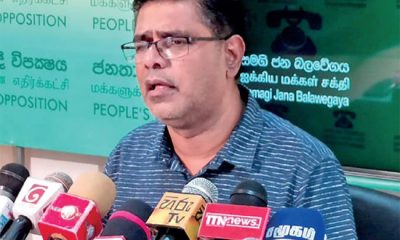Editorial
Origin of current COVID-19 wave

Monday 19th October, 2020
Lt. Gen. Shavendra Silva, Head of the National Operation Centre for Prevention of COVID-19 Outbreak (NOCPCO), Chief of Defence Staff and Commander of the Army is of the view that the infection that triggered the current wave of COVID-19, which has sent Sri Lanka reeling, could be of foreign origin. He said so, taking part in a television programme yesterday. His line of reasoning is convincing.
There were no COVID-19 infections for two months outside the quarantine centres following the elimination of the Kandakadu cluster. If the current wave resulted from infections that had gone undetected for two months, as argued in some quarters, there would have been several outbreaks of the disease in different parts of the country; how come Minuwangoda has become the epicentre of infections?
There is no way COVID-19 can spread here through foreigners or Sri Lankans, who arrive here legally because they have to undergo mandatory quarantine for 28 days and PCR tests. Therefore, going by Lt. Gen. Silva’s aforesaid contention, which we agree with, there are two possibilities: either the infected persons are illegal immigrants who did not undergo quarantine, or those who came here legally but skipped quarantine and PCR testing. It is not possible for illegal immigrants to trigger an explosive transmission of the disease unless they work with a large number of others in a congested environment, and the same is true of those who have come here through proper channels but may have dodged the quarantine process or part of it.
Lt. Gen. Silva has said the country from which the infections responsible for triggering the latest COVID-19 cluster came cannot be named as inquiries are still on. The government may not be able to make an official announcement to that effect, at this juncture, but is duty bound to reveal to the public, after completing investigations, where the infected persons came from and whether they are employed here either legally or illegally. Those who violate the health guidelines, endangering people’s lives and causing enormous losses to the economy now have to face legal action; they can be fined and imprisoned. Therefore, the allegation that some employers have had quarantine laws bent to enable their workers who came here from overseas to report for work before the mandatory 28-day quarantine period is over must be probed and, if anyone is found to have done so, he or she must be prosecuted.
Whether all those who were flown in here, either through the BIA or the Mattala airport, underwent proper quarantine for 28 days can easily be ascertained, for all records pertaining to them including passenger manifests are available. So, the government can find out whether there have been any quarantine law violations on the part of those who came here, if it is not under pressure not to do so. A few weeks ago, a member of the crew of a Russian cargo plane, which landed at Mattala, tested positive for COVID-19. He was found in a hotel in Matara. How come they were allowed to travel that far without being quarantined for 28 days? Have other foreigners also been allowed to roam free, in this manner, after landing at Mattala? Has the Mattala airport become the COVID-19 entry point?
Developing countries are struggling to keep their economies afloat owing to COVID-19, and cannot resort to nationwide lockdowns and quarantine curfews again. Such measures are fraught with the danger of giving rise to even social uprisings; they, as the World Health Organisation has rightly pointed out, make the poor poorer. These nations can be destabilised with the help of coronavirus, which will ruin their economies and make them much more servile to aid donors. It behoves them to be fully awake to this situation. Hence the need for Sri Lanka to dig deeper and find out how the latest wave of infection came about.
Editorial
Shocks from Bills

Friday 26th April, 2024
The Sri Lanka Electricity Bill, which seeks to introduce far-reaching power sector reforms, was presented to Parliament yesterday amidst protests from the Opposition. Minister of Power and Energy Kanchana Wijesekera, exuding his characteristic swashbuckling attitude, said there was a two-week window for anyone to challenge the Bill in the Supreme Court, and a discussion thereon could be held after it was sent to the relevant parliamentary committee. He sounded facetious when he said so, much to the annoyance of the Opposition MPs. Chief Opposition Whip Lakshman Kiriella rightly pointed out that the views of the stakeholders including the Opposition MPs should have been ascertained and taken on board before the first reading of the Bill.
The general consensus is that the Ceylon Electricity Board (CEB) needs a radical shake-up, and power sector reforms are overdue. Electricity consumers are perennially at loggerheads with the CEB, which has become synonymous with corruption, exploitation, bureaucratic red tape, arrogance and inefficiency. Precious little has been done by way of the implementation of the country’s long-term generation plan.
But opinion is divided on how the government has proposed to set about the task. The Minister of Power and Energy is taking great pains to make the Electricity Bill out to be a silver bullet that can rid the CEB of all its ills and help straighten up the power sector; the government has sought to capitalise on public resentment towards the CEB to compass its ends.
The critics of the Electricity Bill view it as a total sellout; they maintain that the government is all out to further the interests of some private companies including India’s Adani Group. According to them, the Bill is aimed at privatising the CEB, and the divestiture thereof will not only adversely impact the interests of the public and the local industrial sector but also pose a serious threat to national security.
The CEB, they argue, was created not to earn profits but to break even at the operating level while supplying electricity to everyone at affordable rates to spur national development; the privatisation of the vital institution will lead to a situation where private companies can maximise profits, as is their wont, at the expense of the public. Some of the critics of the Bill have claimed that if private companies are allowed to gain control over the power sector, they may even be able to engineer regime changes here by causing prolonged power outages.
The government is doing exactly the opposite of what it obtained a mandate for, at the last general election. The SLPP made a solemn pledge not to divest state-owned enterprises. So, the Opposition’s argument that the government should seek a fresh mandate to reverse its policies is tenable. But the fact remains that all those who have governed the country over the past several decades are responsible, albeit to varying degrees, for the current economic crisis, which has left the public at the mercy of the IMF, whose bailout packages are conditional upon the implementation of extremely hurtful structural adjustment programmes. Nevertheless, the Opposition’s arguments against the Electricity Bill are not devoid of validity.
Government politicians are making the most of the current situation to serve their own interests on the pretext of fulfilling IMF conditions. Corrupt deals in the health sector, such as numerous procurement rackets, have come to light. The power sector is equally corrupt, and only a thorough investigation into the controversial emergency power purchase deals, questionable agreements on the establishment of power stations, etc., will help find out those who have lined their pockets and caused electricity prices to increase.
Trade unions have rejected the Electricity Bill lock, stock and barrel, and vowed to go all out to torpedo it. The government is determined to bulldoze its way through, and a showdown is likely. They ought to realise that the economy cannot take any more shocks. They must act with restraint. They have two weeks to discuss the Bill at length, together with other stakeholders, including the Opposition, and ensure that the interests of the public will prevail. One can only hope that one is not hoping against hope.
Most of all, the warring parties had better stop clashing and take cognisance of the fact that unless the blight of structural corruption, which has assumed political, bureaucratic, economic and social dimensions, and eaten into the vitals of the state, is eliminated once and for all, as a national priority, economic recovery will elude the country even if all national assets are disposed of at fire-sale prices; the IMF itself has flagged corruption as a serious issue affecting Sri Lanka’s economy. Mere rhetoric will not do.
Editorial
Brutal suppression of a nation’s conscience

Thursday 25th April, 2024
What Washington asked Sri Lanka not to do in the name of democracy, during Aragalaya in 2022, is being done in the US! There have been police crackdowns on US university students engaged in protests against Israel’s war in Gaza. Hundreds of undergrads have so far been arrested and their encampments in university premises broken up. Columbia University has cancelled in-person classes in view of student protests.
According to international media reports, the New York police descended on a student protest at a plaza near New York University after nightfall, the other day, arrested dozens of protesters, and pulled down their tents. They used force to neutralise the protesters who offered resistance. What the New York police did was similar to the crackdown we witnessed at Galle Face immediately after the elevation of Ranil Wickremesinghe to the presidency in 2022. Have the US police taken a leaf out of their Sri Lankan counterparts’ book, or is it the other way around?
American higher education institutions shaken by student protests against Israeli aggression in Gaza and police crackdowns in the US include Yale, Boston University, Massachusetts Institute of Technology, University of California, Berkeley, Princeton, and University of Michigan.
The unfolding drama in the US reminds us of the 2011 Occupy Wall Street (OWS) movement. The New York police crushed protest marches, using as they did pepper spray, etc., on protesters. Hundreds of OWS protesters who rose against growing inequality owing to corporate influence on the US government were arrested. However, they inspired people to hold similar protests in more than 900 cities in 82 countries across the world. Eleven years later, the US government took up the cudgels on behalf of those who were engaged in ‘occupy’ protests in Sri Lanka!
Why is the US, which pontificates to the rest of the world on the virtues of democratic rights, and even makes interventions to ensure that they are protected, crushing student protests ruthlessly instead of heeding the youth’s call for an end to the massacres in Gaza. After all, the Biden government itself has been compelled to declare that it is contemplating sanctions to rein in Israel, which continues its military operations in Gaza in spite of their enormous human, social and economic costs.
Washington censured President Wickremesinghe for chasing away protesters to clear Galle Face and enable the Presidential Secretariat to reopen in 2022. The Biden administration urged Colombo to tolerate democratic dissent and heed the voice of protesters. The question is why it is not practising what it preaches to others.
American university students have demonstrated that they have a sense of justice and a concern for human lives. They are right in holding protests to crank up pressure on their government to step in to stop massacres in Gaza. True, Hamas must be condemned for its acts of terror in October 2023, when it invaded some parts of Israel, killed many Israelis and took hundreds of civilians hostage. It must release all hostages without further delay. Israel’s right to self-defence cannot be questioned. But the Netanyahu government is using the Hamas atrocities as an excuse for its brutal campaign against Palestinian civilians. Its killing spree must be stopped forthwith, as the US students are rightly demanding.
Some Jewish students have reportedly complained of antisemitic harassment in recent days, and their complaints must be probed and action taken against the culprits, but crackdowns on protests against Israeli attacks on civilians in Gaza cannot be countenanced on any grounds.
The civilised world wept for Jews during Hitler’s reign of terror. Today, a hawkish Jewish government is making the world weep for Palestinians. The voice of moderate Jews who detest violence is suppressed.
The protesting US university students, we believe, represent America’s conscience, which is being systematically suppressed by the Washington-based hawks who thrive on bloody conflicts around the world. There is no way the Biden administration can cover its nudity.
Editorial
Needed: Action, not talkathons

Wednesday 24th April, 2024
There seems to be no end in sight to debates on the Easter Sunday carnage (2019), the latest being the one Parliament is scheduled to commence today. Chances are that the House will be thrown into turmoil, with the sittings descending into a three-day slanging match. If experience is anything to go by, nothing is likely to come of the debate.
It may be recalled that on 23 Oct., 2019, a Parliamentary Select Committee (PSC), which looked into the Easter Sunday terror attacks submitted its report to Parliament. The SJB MPs, who claim to have pressured the government to hold the debate to kick off today, were members of the Yahapalana government, which appointed the aforesaid PSC. One can only hope that parliamentary time will be utilised productively in the next few days.
As for the Easter Sunday attacks, there are several schools of thought, the prominent being that they were engineered by the SLPP to win the 2019 presidential election; ISIS had them carried out; Moulavi Mohamad Ibrahim Mohamad Nauffer, who is in custody, masterminded them, and they were part of an external conspiracy to destabilise Sri Lanka. The general consensus is that there was a conspiracy, as former Attorney General Dappula de Livera is reported to have said.
The claim that ISIS was responsible for the Easter Sunday terror attacks is widely considered far-fetched. Nobody seems to have taken it seriously.
A possible connection between the terror strikes and the SLPP was hinted at by the aforesaid PSC, which said in its report that a probe had to be conducted to find out whether they had been aimed at creating conditions for a regime change in the latter part of 2019.
The story that Nauffer is the terror mastermind is floated by the SLPP. In 2021, the then Minister of Public Security Sarath Weerasekera told Parliament that the FBI (of the US) had confirmed that Nauffer was the mastermind. But National Thowheed Jamaath (NTJ) leader Zahran Hashim’s wife, Fathima Haidya, told the Presidential Commission of Inquiry (PCOI), which probed the Easter Sunday carnage that Zahran and Nauffer had been in contact with a person called Abu Hind in India. Hind has been identified by an international expert of terrorism as a character created by a section of a provincial Indian intelligence apparatus. Zahran believed that Hind was an ISIS representative, according to the PCOI report. Pulasthi Mahendran aka Sara Jasmine, the widow of Muhammadu Hasthun, who blew himself at St. Sebastian’s Church, Katuwapitiya, in 2019, is believed to be privy to the NTJ’s secrets. Initially, it was claimed that she had died in a blast in a house in the East during a raid conducted by the army and the police, but it is now believed that she fled the country with the help of a foreign intelligence outfit. If she is still alive and can be arrested, it may be possible to ascertain information about the terror mastermind and the NTJ’s foreign links.
Politicians, religious leaders, high-ranking military and police officers, terrorism experts and Archbishop of Colombo His Eminence Cardinal Malcolm Ranjith himself have categorically stated in their testimonies before the PCOI that there was an external hand in the terrorist attacks.
Those who claim to have identified the Easter Sunday terror mastermind/s or ascertained vital information to prove who masterminded the carnage are heaving like the proverbial blind men who tried to figure out what an elephant was like by touching different parts of the animal’s anatomy, came to different conclusions and quarrelled. The Easter Sunday attacks, we believe, have not been investigated properly from all angles. Above all, former President Maithripala Sirisena’s claim that he knows who masterminded the carnage must be probed, and action should be taken against him if he has sought to mislead investigators.
Minister of Public Security Tiran Alles has renewed his offer to have the leaders of the Catholic Church briefed on the status of the ongoing police investigations into the Easter Sunday tragedy. Claiming that the Catholic prelates have not responded to his offer, he has said he is willing to take on board their views and even make adjustments to the probe, if necessary. Why his offer has not been accepted is the question.
There is no need for the Easter Sunday terror attacks to be debated in Parliament. What is needed is a thorough, credible investigation thereinto. The PCOI report has some flaws, as we have argued in a previous comment, but it is based on an extensive probe painstakingly conducted for a long time and contains valuable information. It can be the basis for a future probe besides the one being conducted by the police.
-

 Business5 days ago
Business5 days agoCEAT Kelani launches three new radial tyre variants in ‘Orion Brawo’ range
-

 Business4 days ago
Business4 days agoCeyline Travels and MBA Alumni Association of University of Colombo sign MOU
-

 Business5 days ago
Business5 days agoHayleys Fabric celebrates triple triumph at ISPO Textrends Spring/Summer 2026
-

 Business6 days ago
Business6 days agoUrgent appeal from Sri Lankan exporters on rupee appreciation
-

 Business4 days ago
Business4 days agoMaldivian to launch direct flights to Colombo
-

 Business2 days ago
Business2 days agoTelin and Dialog Axiata ink strategic partnership to manage international voice and SMS termination
-

 Sports5 days ago
Sports5 days agoHello Madras, ‘ai api kaluda?’
-

 News3 days ago
News3 days agoSJB demands to know who occupied rooms 616 and 623 while Zahran was on 6th floor



























